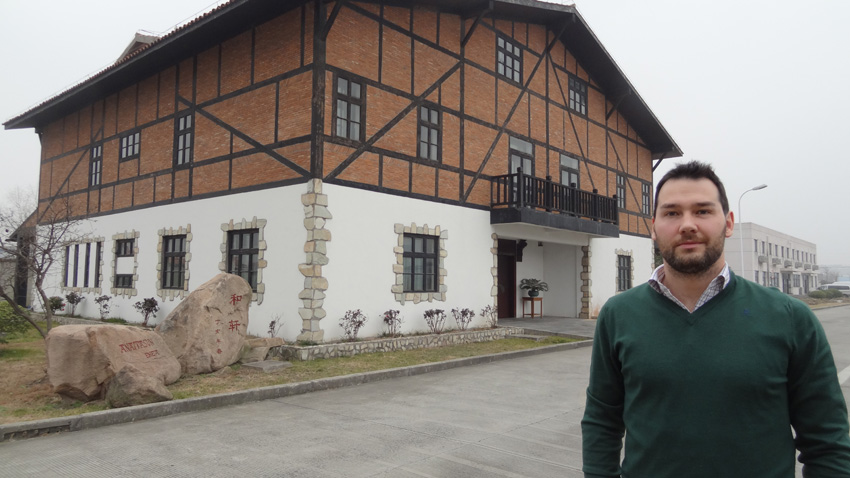Joseba Etxarri. This thirty-three year old lawyer and economist told us of his childhood fascination with China and when the opportunity arose to work there, he had no doubts. The park that he coordinates in Kunshan, today includes 16 companies getting all kinds of support from Anaitasuna, a "baserri" shaped building is at the heart; they provide material as well as immaterial support to nearly 40 expatriates that work in the factories, the majority, young Basque professionals.
Are Basques and Chinese so different?
There are some similarities and many things that are polar opposites. Among our similarities I would mention the notion of family that is deeply rooted in both cultures. In some places in China there is also a matriarchal element, as it is in the Basque Copuntry, for example in Shanghai, where the wife is in charge of the household and its finances.
Is it difficult to undertand and explore Chinese culture?
I would start from the point that we are different and then we have to build our relationship based on this. You have to keep in mind that China is not just one country, it’s a civilization. Here they see things in a holistic way, things are seen as a part of a whole, while in Euskadi and in the West, the thought is more sequential, this is what we see in the classic theater: approach, knot and outcome.
An example of that?
In a negotiation, given the approach and having passed the knot, it's normal that all of the sudden your counterpart returns to the approach, or the other way around, goes right to the price, to later return to the knot. In reality, relationship is considered the most important thing and it is the relationship what sustains the business, so both parties need to care for and nourish the relationship, being the paper and documents something not as important, it tends to be considered a mere formality. In fact many times, contracts are reduced, shortened, and do not regulate everything. It can be complicated for those who have a more sequential approach and vice versa, and it’s difficult for them to understand that we are so structured.
Things don’t ride on what is written.
Many times, rules are not sufficiently explicit and its objectification depends on the relationship that you have, for example with different bureaus it is interpreted in the manner you think it should or in a favorable way. In Euskadi, for example, the tax advantages of a business are clear, they are defined by the written law, black or white. Here you move more on a gray scale.
Does the famous “Basque word” make sense here?
It means committing yourself to something against all odds and in China the concept leans more towards conditions are changing and the word may vary depending on conditions in following moments. Some can interpret it as breaking your word, but you have to understand it within the holistic point of view. It means getting from A to B is not always by a straight line, you can oscillate, logically within certain parameters, but allowing theses oscillations so the Chinese ways can connect and coexist with our western logic.
A thousand people work at the Mondragon Park in Kunshan. The baserri Anaitasuna is a basic piece.
It has become the glue that gives cohesion and coherence to the project and their companies. We join forces. In China, size matters and provides volume and capacity for dialogue, support in the most vairied issues as well as training and other benefits; we also have, for example, a dining room with daily business lunch, Euskadi style. We also complement the Shanghai Basque club well, which is headquartered in the city and addresses a more cultural and playful and leisure side of activities.
I believe you are getting married soon.
In Bilbao in August (smile). I studied at the University of Deusto, in Bizkaia, and my fiancé nearby, at the Business School even though we met here. She was born in Elche of a Chinese family. Our plans are to stay in China for now. I carry my homeland in my heart but professionally I think that I have a lot left to do here, in China, before returning to Euskadi.






 Send to a friend
Send to a friend Add comment
Add comment








